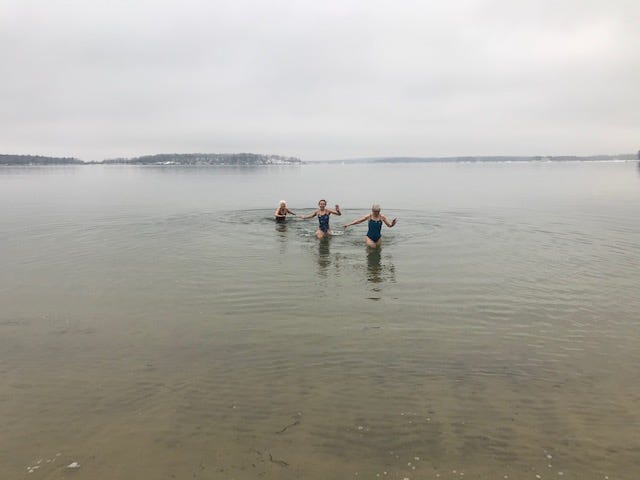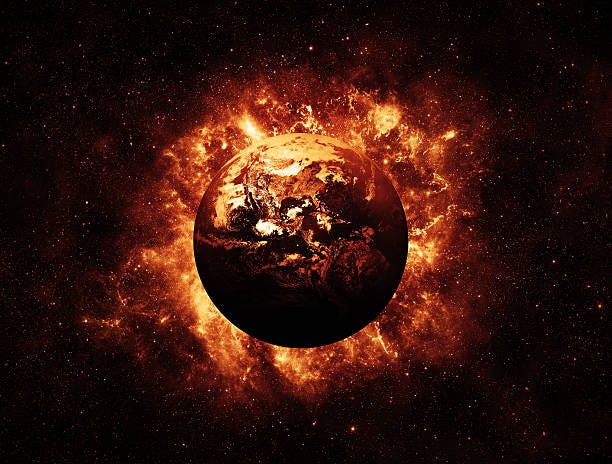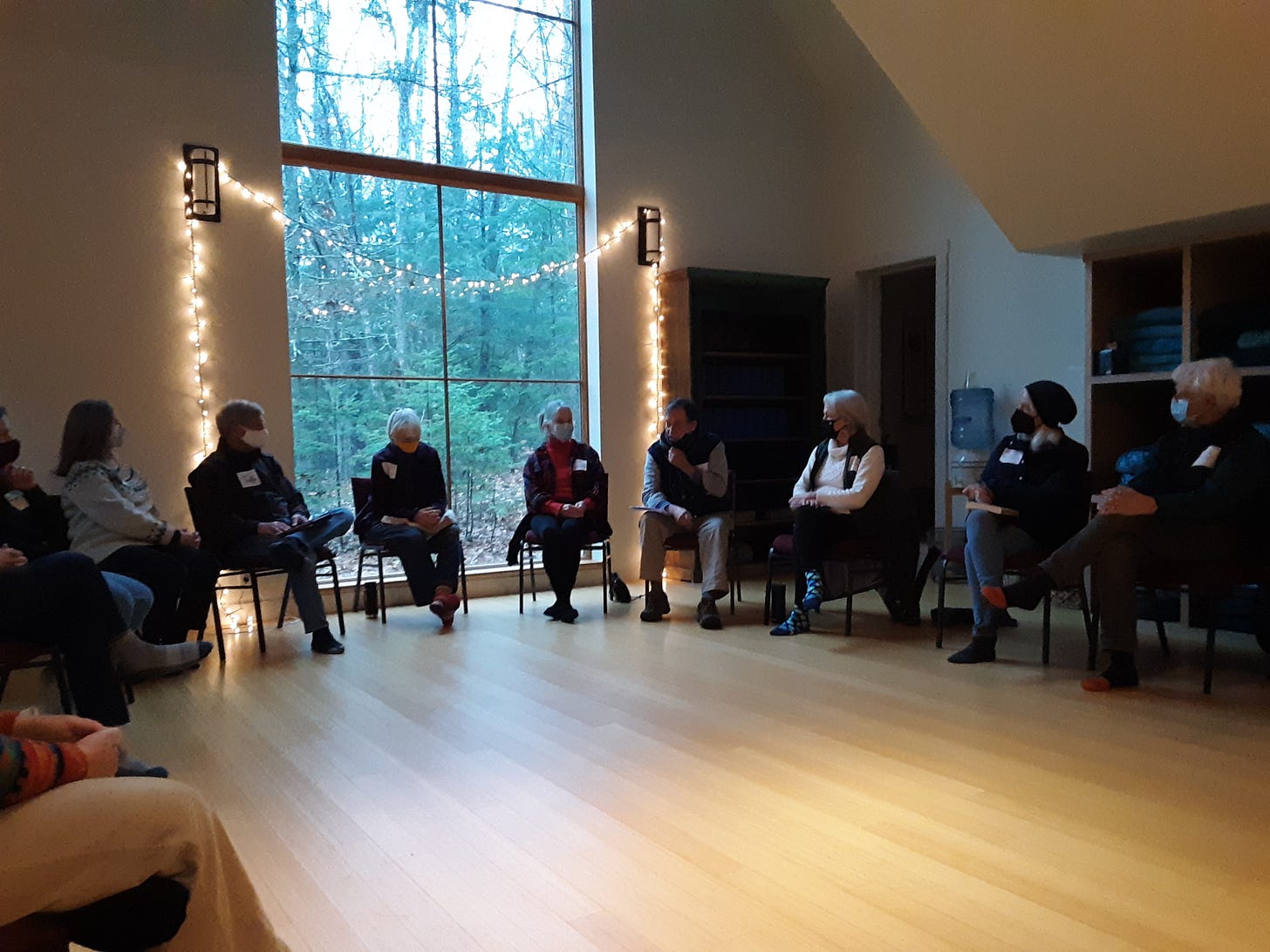For years Finn has been worried about our dying. When the pandemic first arrived, my grandson worked hard to convince me to believe in God at least 10% so that, in the event of my death, the gates of heaven would swing wide and I would wait patiently for his arrival. With his grandfather safely back from the hospital, my plan for tomorrow filled both him and his sister with dread, again. “People die from doing that, Gigi, their hearts stop. It’s insane. Don’t do it.”
Here’s my plan: tomorrow I will throw myself into the sea. I will drive to the small swath of public beach in Freeport where, years ago, when the tide was high, I taught my children how to extend their arms and legs, to lie back and trust the water to keep them afloat. When I get out of the car I will take special notice of the angle of the dunes, the height of the sea grass, the distance of the road from the water, for, depending on how fast the sea rises, this spot in Freeport will, sometime this century, very likely, disappear under three feet of sea rise.
I will throw myself into the sea because it is Solstice, the darkest day of the year. This darkness calls out for raucous frolic to diminish the power of the dark underworld, whose meadows are strewn with asphodel, the gray green flower of death which stalked my family last week. A year ago, the first year I joined my friend T. in this previously unthinkable ceremony, I threw myself into the sea to break the pall of Covid ‑ the uncertainty, the fear. After a brief heart-pounding moment submerged in the icy water, I waded back to shore, shrieking and laughing. “Take that, death, you can’t catch me,” I said as I stood on the sand and T’s granddaughter wrapped me in a towel.
This year I will throw myself into the sea again, and again thumb my nose at death who came so close last week. But, through the dazzling miracle of arthroscopic surgery, electrocardiograms, CT scans, magnetic imagery, and a top-notch medical team at a top-notch hospital, by Monday my dear fellow was home and feeling so top-notch himself that he drove uptown for the sole purpose of mailing a package.
His recovery and the kindness that fell on us like pennies from heaven when friends and family heard about his illness stand out like stars on a moonless night against not only the darkness of this darkest time of year but the darkness of the news this week. Never in my lifetime has there been a darker time. The inventory of dark matter is long and familiar to all of you, readers. I won’t recount the list in full here, the words would collapse on themselves and fall in a pile of rubble at our feet.
How did we get here to this previously unthinkable place where the foundations of life and civil discourse we once stood so solidly on, once took for granted like breath, are precarious, splintered, broken? How did I not see this coming, take more seriously the warnings of James Hansen, the scientist who first testified to Congress in 1981 about the dangers of carbon dioxide buildup, or the warnings of James Baldwin about the existential threat to democracy of unexamined racism?
I had a chance a few days ago to ask this question to Bill McKibben, a man who has been thinking and writing about the climate crisis all his sentient career, a man who didn’t, like me, lapse into a trance induced by red velvet couches, avocados in January, blood-red steaks from Argentina, cheap gas appliances, oil furnaces burning in the dank basements of our lives: hidden springs of heat, hidden sources of destruction.
McKibben’s new national climate action organization, The Third Act, is for people over sixty: people who have resources, clout and wisdom and nothing to lose by speaking out boldly now. The organization is only as old as FreeportCAN’s is here in Freeport, so I have much to learn from them as they build a culture with care and mindfulness. Invited to join a Zoom call with Third Act members from Vermont and Maine that included Bill, I listened as he soberly reported a conversation he’d had hours earlier with Jim Hansen. Hansen, McKibben said, is alarmed about the reports coming from the Arctic about its warming four times faster than the rest of the globe.
“How did we get here?”, I asked Bill when it was time for questions. What I meant was, how did we, the ones who went to Selma, who chanted “Make Love Not War” in the streets, who were there for the first Earth Day, let this happen? He brightened a little at the question, a question whose answer he too has been pondering, so much so that he is even now writing a book on that very question. “We had it all too good,” he said. “We had the Clean Air Act, the Clean Water Act and the Environmental Protection Agency. We didn’t believe bad things could happen.”
I fumble now with pronouns, nouns: I, we, my generation, the boomers, were unable to imagine that this brilliant trajectory of science and technology and commerce and growth that began when we were children as we emerged from the second World War wouldn’t turn out all right. If we could put a man on the moon and flash that radiant picture of earth back from that planet, we were like gods: invincible, boundless.
The fall is hard. The punishment harsh and devastating. And humbling. The headline of this morning’s Portland Press Herald reads, “How Maine Lost Control of the Covid 19 Pandemic.” Even the virus is teaching us lessons about limits to our power and grandiosity. When I got my first shot in the arm last March, I did a little jig, thinking that mankind had prevailed yet again over another obstacle thrown our way. We were saved. Again, I failed to consider the limits of mankind’s mastery over nature. The prowling, mutating virus is whispering its lessons to us. There are life forces far greater than the ones we humans have tried to dominate and colonize. We have much to learn about how to live in this place called earth.
This year, after reassuring the grandchildren that I won’t stay in the water long enough for it to kill me, and assuring them that Gigi Bob will be there with me to make sure I am okay, I will throw myself into the sea because my body will answer the chilling cold with a great pulse of life; every cell in my body will call out to the heart for help to resist this torment of cold. Soon, it will feel as if every cell is dancing a little joy-dance as my skin and blood start to warm, as if the baptism in the sea had transformed me from an old body into a newly formed star.
This year I need that great pulse of life even more than last, more than any other year of my life.
But this year I have more than this swim in the sea to support this old body, this old spirit. This year I have the spirit, the knowledge, the dedication, the friendship of the remarkable people of Freeport who have responded to the invitation to join FreeportCAN, to work together to save something we love. There was so much energy in the big room in L. and P.’s barn last week when we had a small introductory meeting that, had we a way to capture it, we could have provided Freeport with weeks’ worth of renewable energy.
And the same is true of the two Third Act meetings I was part of last week. I believe people are ready, not just for a new organization, but as Bob F. from Third Act said, for a movement, a mass movement of people who finally, and almost too late, get it.
I leave you with these words: If not me, then who? If not now, then when?







Lovely Kathleen, beautiful weaving of so many strands in this piece. And bravo on your plunge. I’m a weekly plunger.
like reading this one a lot too. I will have to look up The Third Act program.